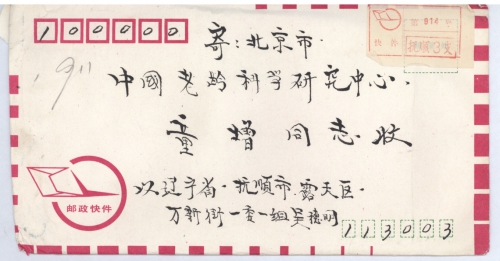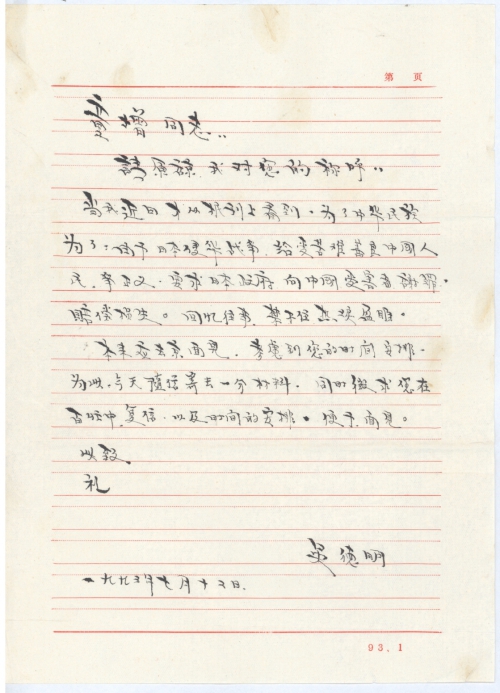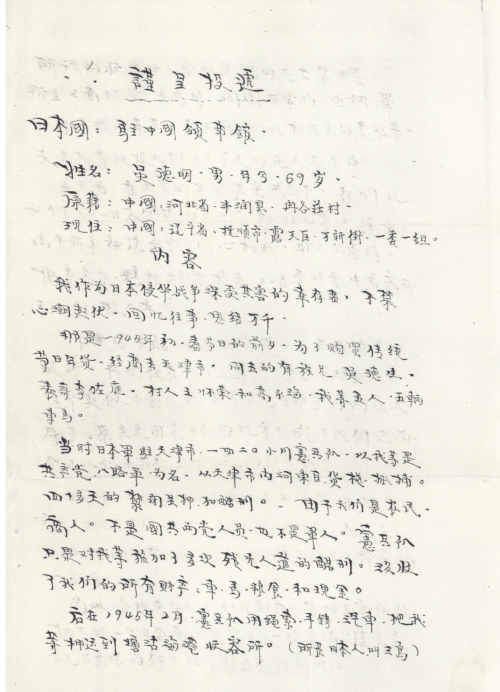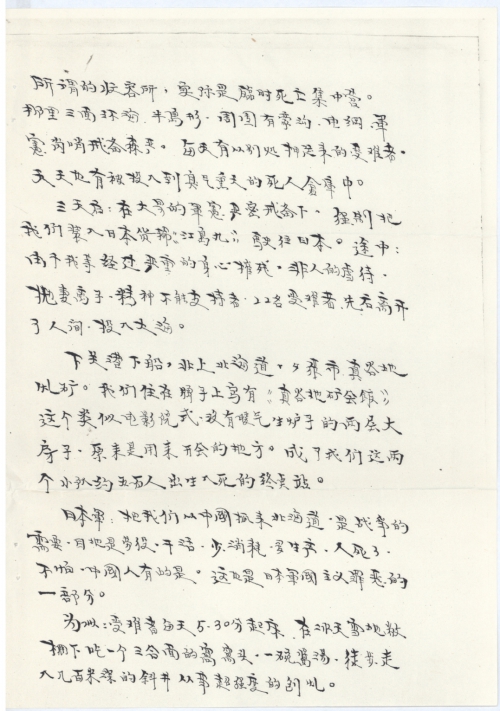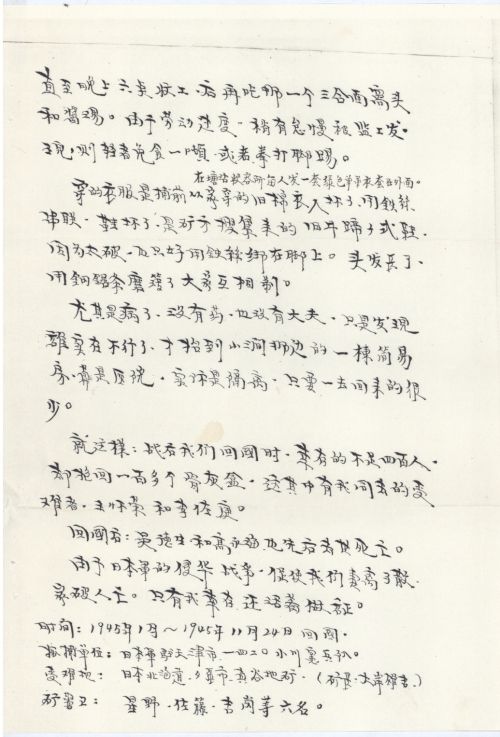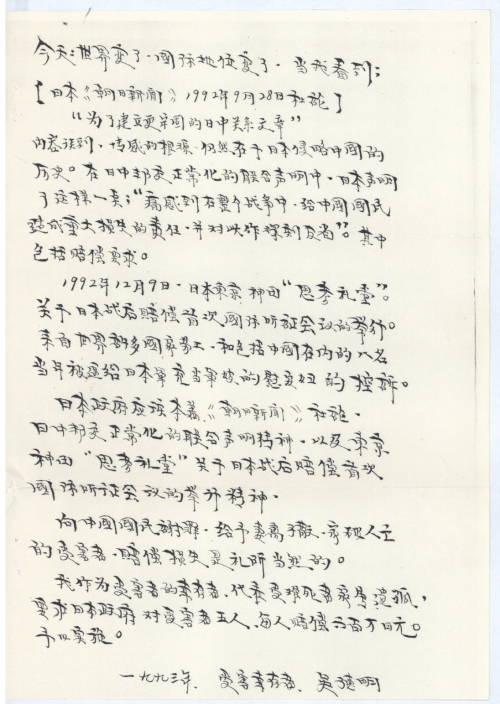Date of letter:1993-07-12
Address of author:Fushun City, Liaoning Province
Date of event:1945
Location of event:Tianjin City
Name of author:Wu Deming
Name(s) of victim(s):Wu Deming, Wu Desheng (Wu Deming’s brother), Li Zuoting (Wu Deming’s cousin), Wang Huairong and Gao Yonghai (Wu Deming’s fellow villagers)Type of atrocity:Slave Laborers, Others(SL, OT)
Other details:On the eve of the Spring Festival in 1945, my brother, my cousin and I as well as two other villagers went to Tianjin. The Japanese soldiers considered us as members of the Eighth Route Army and arrested us. We suffered all kinds of tortures and then were taken to Japan as Slave Laborerss. During the period, we lived a dog’s life: we could not have enough food or clothes; did a lot of hard work every day; and could not have medicine or see a doctor if sick. After returning home, Wu Desheng and Gao Yonghai died soon. The Japanese aggression of China and forcing me to be a Slave Laborers broke up my family. I require the Japanese government to compensate me and apologize to all the Chinese people.
Comrade Tong Zeng:
Please forgive me for addressing you that way.
Today I learned from the newspaper that you are pursuing justice for Chinese victims of Japan’s war of aggression against China by demanding an apology and compensation against the Japanese government. The recall of past memories brought tears to me.
I should go to Beijing to meet you personally, but considering your arrangement, I am sending you a letter attached with a material. I am asking you to take time to reply me and arrange a meeting for us.
Best regards,
Wu Deming
July 12, 1993
Letter of Claims
To the Japanese consulate in China,
Name: Wu Deming, male, 69
Place of birth: Ran’gezhuang, Fengrun, Hebei, China
Address: 1st Group of 1st Community, Wanzhan Street, Lutian, Fushun, Liaoning, China
Content
I am a survivor and victim of Japan’s war of aggression against China. The recall of past memories brings mixed feelings.
It was before the Chinese New Year of 1945, I, my elder brother Wu Desheng, my cousin Li Zuoting and Wang Huairong and Gao Yonghai from the same village drove five carriages the Business Department of Tianjin to purchase goods for the festival.
The Japanese No. 1420 Ogawa gendarmerie stationed in Tianjin, China arrested us at a goods shop of Neihedong, Tianjin on a charge of being members of the Communist Eighth Route. We suffered over 40 days’ cruel punishment and detention. As we were just farmers and traders instead of members or soldiers of the communist or Kuomintang party, the gendarmerie only cruelly punished us several times and confiscated our property including carriages, horses, food and cash.
Then in February 1945, we were forcibly sent to a shelter (head of the shelter is a Japanese surnamed Mishima) at Tanggu harbor by ropes, handcuffs and vehicles. The shelter was in fact a temporary death camp, surrounded by the sea on its three sides and strictly guarded by ditches, wires, gendarmes and sentries. Every day, there would be new victims being sent here and also victims being thrown into the stinky warehouse for the dead.
Three days later, we were taken on a Japanese ship named EJIMA-MARU under careful supervision of Japanese gendarmes. As the victims were physically and mentally suffered from inhuman maltreatment and getting separated from their family, 22 victims consecutively threw themselves into the sea and died.
After getting off the Shimonoseki port, we were taken to Shintani Mine in Yubari, Hokkaido. We lived in a big two-storey house with a fireplace and a plate reading “Shintani Mine House” that was originally used as a meeting hall. This place became a shelter for about 500 victims who were divided into two groups.
The Japanese army captured us here from China to meet the needs of the war by making us work to create more production with less consumption. They were not worried about the death of laborers because there were so many people in China. This is also part of the evil of Japanese militarism.
We got up at 5:30 a.m. every day, ate a steamed corn bread in the open cold weather with a bowl of ginger soup, then walked down an inclined well of several hundred miles to do high-intensity work-digging coal. After we got off from work at 6 p.m. at night, we again ate a teamed corn bread with a bowl of ginger soup. We would be beaten or punished by not giving us food if the supervisor saw us taking a rest at work.
Our clothes were those on us when we were arrested. We each were provided with a green military coat at the shelter. We wore old hoof shoes provided by the mine. When the quilts were worn out, we fixed them with wires. But the shoes were so worn that we had to tie them on our feet with wires. When our hair grew long, we ground a small blade into a knife to cut it short.
There were no doctors or medicine for sick laborers. Those who were truly seriously ill would be sent to the hospital, a simple house near the mountain river to be quarantined and a few of them could come back.
So, when we returned to China after the war, there were less than 400 survivors and we brought back over 100 cremation urns, including Wang Huairong and Li Zuoting who were taken to Japan with us.
Wu Dengsheng and Gao Yonghai passed away consecutively after we came back.
As the war separates me from my wife and children, I become homeless and I am the only living survivor to be the witness.
Time: From January 1945 to November 24, 1945
Organization capturing us: Japanese No. 1420 Ogawa gendarmerie stationed in Tianjin, China
Place of suffering: Shintani Mine in Yubari, Hokkaido, Japan (Head of the mine: Kumakichi OGISHI)
Guards: Six guards including XX HOSHINO, XX SATO and XX YOSHIOKA
Today, the world has changed and the international status of China has changed. I read an article titled “To Establish More Solid Sino-Japanese Relations from the editorial edition, Japan’s Asahi Shimbun of September 28, 1992 which mentioned the history of Japan invading China. Besides, during the Japan-China Joint Statement on the normalization of diplomatic relations, Japan stated that, “We feel painful for causing severe losses to Chinese people during the war and will implement deep self-examination on that.” Compensated requirements are included in the statement.
On December 9, 1992, the first international hearing about Japan’s post-war compensation was held at Thinking Hall in Kanda, Tokyo, Japan. At the hearing, forced laborers from many countries including 8 Chinese as well as women who were forced to be comfort women charged the Japanese army with horrible crimes.
The Japanese government should apologize to Chinese people and compensate victims who were separated from their family and became homeless with the spirits of the editorial of Asahi Shimbun, Japan-China Joint Statement of the normalization of diplomatic relations and the international hearing about Japan’s post-war compensation.
As a surviving victim, I demand a compensation of 6 million yen to each of us five victims against the Japanese government on behalf of the relatives of other dead victims as well as implementation of the compensation request.
Surviving victim: Wu Deming
1993














